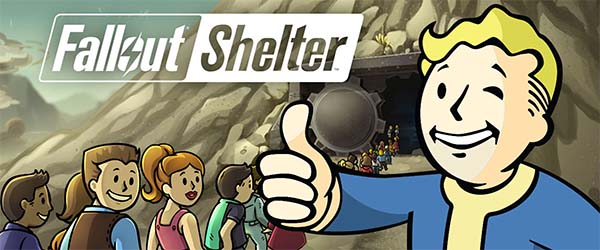
My recent forays into mobile and casual games has been pretty disappointing. I'm becoming pretty pessimistic about these games, and hoped that Bethesda's Fallout Shelter might have the production quality and complexity of design to keep my attention. After all, Bethesda doesn't seem to be using this game as a simple delivery service for micro-transactions and actually seemed to be taking it seriously as a video game.
Fallout Shelter does, indeed feel like a more honest attempt to make a true video game for mobile devices. Some of the telltale features of casual games are present, such as rewards for daily play and some micro-transactions. But the game isn't constantly badgering you to buy micro-transactions, and the player can't spend money to accelerate the basic production cycles of the game (as is the case in most other casual, resource-production games of this type). In fact, there are plenty of high-level items that can be unlocked fairly early via in-game rewards without having to spend any money at all.
Fallout from a different perspective
The player assumes the role of a vault overseer in the Fallout universe and must build your vault and manage the dwellers that live inside. Each dweller is assigned to a specific room in order to produce resources. There are three resources: power, water, and food, that are each produced in various rooms that you can build in the vault. Each resource has its own unique utility. Power allows rooms to keep functioning. Food keeps the dwellers from losing HP. Water keeps the dwellers from suffering radiation poisoning. And bottle caps are used as the primary currency for building rooms and buying or selling equipment. I don't get the sense that the different resources are just a way of forcing the player to grind more to pad out the length of the game, and the costs of new items stay fairly low and reasonable. There is still grinding, but it's nowhere near as painful or tedious as in Trexels, which has a very similar basic gameplay mechanic. Management is also more complicated than in Trexels, since each dweller has specific S.P.E.C.I.A.L. stats that affect how quickly the room will produce resources. So it matters which room a dweller is assigned to.
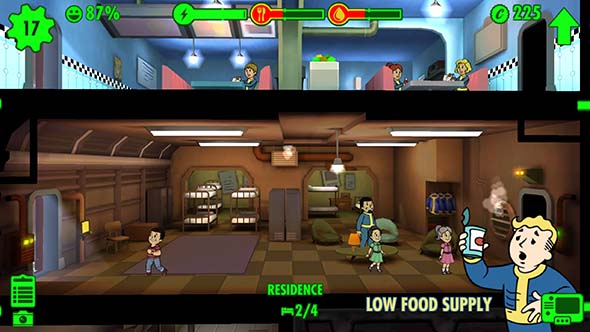
The different resources have different utility, which makes the game feel less like a grind.
Worked rooms will produce resources every so often, but they can also be rushed if you're desperate. Or if you want extra money, or if you want experience for your dwellers, or if you just want surplus resources, or if you're just bored. Rushing production seems to be highly encouraged by the game mechanics, since it is the fastest path to bottle caps, experience, and resources! The tradeoff is that you risk triggering an "incident" whenever you rush production. Incidents can include the room breaking out in fire, or radroaches or mole rats infesting the room. Both will do gradual damage to any dwellers in the room while the dwellers try to fight them off. Incidents are easy enough to deal with, especially if you have a hefty stockpile of stimpacks, and if all your dwellers are equipped with weapons. The risk of incidents will increase each time you attempt to rush, and so everytime I load up a vault, I usually collect all the resources already accumulated, then I repeatedly rush all the production rooms until the risk of incidents goes up to 60% or more. And once you get a medbay and laboratory, you can produce (and rush) stimpacks and rad-aways to heal your dwellers from incidents, which makes this cycle almost trivially easy to maintain.
Incidents can also occur randomly, and you'll even see the occasional random raider attack... [More]
c4477ea0-6ff6-42c3-bc43-e9d325496f82|1|4.0
Tags:Fallout, Fallout Shelter, Bethesda, vault, post-apocalypse, wasteland, raider, resources, dwellers, mobile, mobile gaming
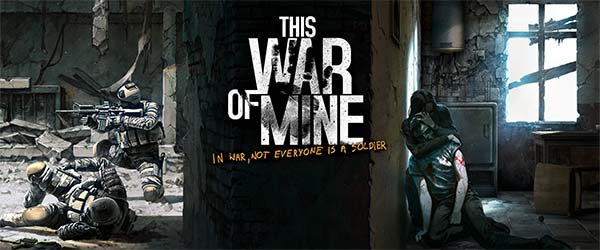
Games have an awkward relationship with war. Most games embrace violence and conflict because they are very easily simulated by computers and mapped to a set of easy-to-understand mechanics. Computers aren't as good at understanding or reacting to speech or emotion as they are at allowing a character to move around in a space and at tracing the path of a bullet or artillery shell. So when a game is about war, it's almost always told from the perspective of a soldier, someone actively participating in the war. And that character's participation is usually presented as noble and honorable, with the people that you are shooting being given little - if any - humanization at all. In many cases, the games will go out of their way to de-humanize the player's opponents by presenting them as literal demons, aliens, or the so-easy-to-hate Nazis.
While there are plenty of examples of games that deal with the behind-the-scenes causes and effects of a war, or the politics of conflict, these elements very rarely appear as central gameplay elements (outside of grand strategy games like Civilization, Total War, or Europa Universalis). Usually, the player plays on the battlefield, and any politics or effects beyond the battlefield are just material for non-playable cutscenes. At best, you might end up with a game that puts the player in the middle of the battle, but which has civilian characters that play a large role in the story.
One of my favorite games of the PS2-era is Ace Combat 4, which is a jet fighter combat game that found a comfortable middle-ground between flight sim and arcade shooter. Its narrative revolved around a child living in an occupied city, who befriends the ace fighter pilot of the occupying nation's air force. The player, however, takes on the role of a nameless, faceless ace fighter pilot belonging to the opposing liberation force. This created a fascinating dichotomy in which your success in missions resulted in defeats for the enemy ace who was the focus of the narrative. He falls into depression and alcoholism as the player systematically shoots down his wingmen and friends, and it served to humanize both sides of the conflict and exposed the human cost of war. One man's victory is the other's defeat. Your own victories became increasingly bittersweet as the game neared its final mission. It was a beautifully constructed scenario that has stuck with me to this day. I suspect that This War of Mine will leave a similar impact on me.
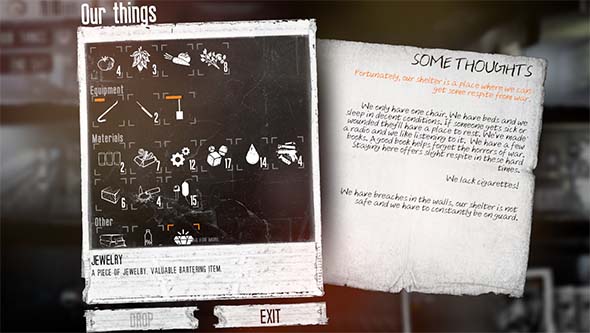
The logistics of keeping your shelves stocked with food and medicine is the primary challenge.
This War of Mine also reminds me of my visit to the Imperial War Museum in Manchester, U.K. this past January. I was really surprised by the difference in presentation that museum had as opposed to most museums that I visit in the United States. Whereas a museum in the U.S. will focus on exhibits of weapons, uniforms, vehicles, battle tactics, and politics behind wars, the IWM was focused primarily around the civilian costs of the two World Wars. It featured exhibits about food and material shortages, how women had to work as battlefield nurses and in factories, and how supplies were moved between cities under siege. It presented the wars as much more personal and ignoble and focused on how it affected people's day-to-day lives, and how the majority of people simply had to live through it. That's the same approach that the Polish studio behind This War of Mine took for their survival game.
Behind the lines
This War of Mine doesn't take place on the front lines or the battlefields. Instead of controlling a soldier, you play as a group of survivors in a rebellious city under siege. You have found a shelled building that you have claimed as a shelter, and every night, you must send one of your group out to scavenge one of various sites around the city for food, medicines, and other supplies to enable your group to [hopefully] survive till the end of the war. In the meantime, those who stay in the shelter must contend with the risk of being raided by other survivors during the night and having your hard-earned supplies stolen from under your own nose - or worse: somebody being hurt or killed.
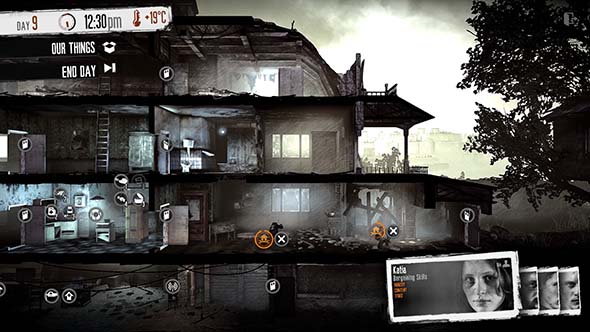
Your close-knit group of survivors must build and defend a shelter and scavenge for supplies.
The result is a game loaded to the brim with choices and consequences. How do your survivors spend their daytime hours? What items do you attempt to craft from your middling inventory of supplies? How do you defend yourself from raids? Do you send your one gun out with your scavenger in case he runs into hostile bandits, or keep it at home to defend your shelter from raids? Who do you send out each night to scavenge? Where do they go? And what do they bring back with them? The "rogue-like" fashion of the gameplay means that there's no undoing and no retries. This, combined with the scarcity of resources, makes every choice, every action, and every death is permanent. This gives a great deal of weight to all those choices that the game gives you.
... [More]
86d552ea-8fe5-4968-9a7d-1d98afbd4919|2|5.0
Tags:This War of Mine, PC, Steam, 11-bit studio, indie gaming, strategy, war, siege, refugee, civilian, survival, rogue
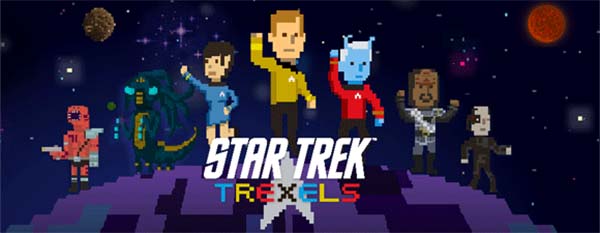
I finally got around to buying a modern phone, upgrading my Galaxy SII to a Galaxy S6 Note Edge. With the upgrade in tech, I've finally started trying out some of the free-to-play mobile games that are flooding the market. I had already played SimCity Buildit on my previous phone, but its poor performance and bugs held me back from bothering with any other games on that old SII. But now that I have a new phone, I wanted to try the Star Trek-themed game Trexels.
Star Trek games are few and far between, and good ones are virtually unheard of. Probably my favorite Star Trek game ever was the Windows 98 4x-strategy game Birth of the Federation, which was basically just a Trek reskin of Microprose's Master of Orion II. It wasn't the most technically proficient of games, and the A.I. blatantly cheated, but it was a game that captured the essence of Star Trek by being primarily about exploring the galaxy and colonizing new worlds. Most Trek games are content to just be reskins of shooters or space combat games, which always feels out of place. So Birth of the Federation, despite its obvious flaws, has always stood out to me as a game that really felt like one of the most appropriate uses of the Star Trek license for a video game.
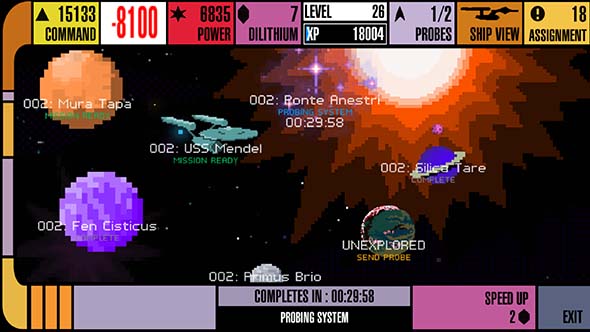
Finally, a Star Trek game that's about exploring space, rather than just shooting things!
And that brings us to Trexels, a free-to-play mobile game that is about exploring space while developing the skills of your ragtag crew and completing the construction of your ship. Sounds like a Star Trek-worthy premise. At least it isn't a first-person shooter. You start the game with a mostly-empty ship and handful of crew members. Your task is to build infrastructure in the ship to allow you to acquire new crew and harvest resources (including "command point", "research", "power", and "dilithium").
To boldly grind...
Resources are harvested by assigning crew to work the relevant rooms, and then you wait some period of real time for the crew to complete the assignment so you can collect the resource. You spend your accumulated resources to build new rooms in the ship, train your crew to increase their ability points, and attempt missions. Completing missions rewards you with experience and ... more resources? So it's kind of circular: you spend resources to attempt mission, and then are rewarded with some of the resources that you spent.
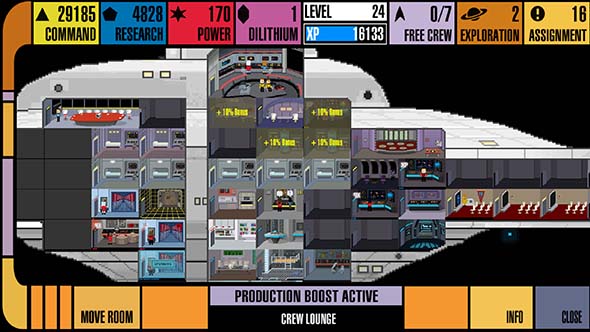
Your crew harvests resources from specific rooms, and other rooms unlock abilities and power-ups.
You also gain general experience, which doesn't really do much other than to unlock new expansion slots for rooms in your ship. Virtually everything you do gives you experience, so you level up fairly quickly. I always have way more available expansion slots than I can possibly use due to the slow rate in which you acquire resources. Once you get past the very first few missions and room-construction, the game really starts to turn into a slow, slogging grind... [More]
97535ad4-7e52-48fc-bff8-8d9b5c2f63d7|2|4.0
Tags:Star Trek, Trexels, YesGnome, xCube Games, construction management, exploration, space, crew, ship, TOS, social gaming, mobile gaming, mobile, iOS, android

One of the most glaring problems with Madden for many years now has been the passivity of offensive receivers. They've been completely unwilling to make any effort to track the ball in the air and go up and get it. Often, underthrown balls would be easily intercepted because receivers would mindlessly run their route and never make an effort to come back towards the ball to catch it. This, combined with defensive backs who always had eyes in the backs of their heads, lead to a lot of interceptions and a very frustrating experience in the passing game. This year's Madden finally makes some effort to address this problem, and I honestly thought that this might finally be the year in which things started to really come together for this series. I wasn't expecting Madden 16 to suddenly be the NFL 2k5 of our generation, but I was at least expecting to see a product that felt more complete, in which all the areas of on-field action seemed - at the very least - to be competent.
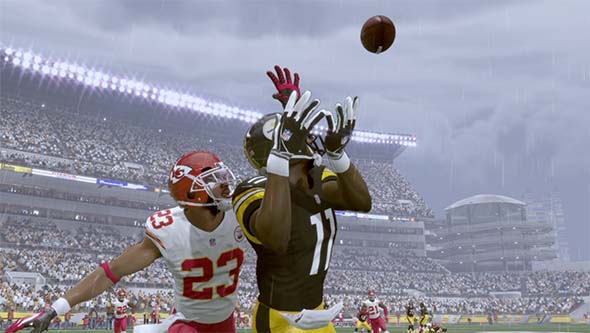
Long-standing problems with passing, catching, and pass defense were points of emphasis this year.
But as the summer went on, and all I ever heard about was some silly new "Draft Champions" mode that sounded like a half-assed fantasy football season, I really started to lose any hope and excitement that I had. Normally, I'd buy Madden used in order to keep my money out of EA's greedy hands. Fortunately for EA, the first two stores that I went to were sold out of Until Dawn, so I decided to go ahead and splurg on Madden so that I'd have something to do that weekend.
The mandatory tutorial featuring a hypothetical Super Bowl 50 rematch between the Steelers and Cardinals is an absolute train wreck. A handful of players recorded unbelievably cheesy dialogue for this sequence that seemed to imply that this year's Madden was going to put some emphasis on the personalities of the players and include some smack talk (the kind of thing that Madden '05's "Storylines" feature was going for). I thought it was weird that I hadn't heard anything about this in any of the promotional material or previews. It seemed uncharacteristic for Madden and contradictory to the NFL's careful regulation of the public image of the league.
The tutorial proceeded to force me through a series of intolerably-scripted plays and highlights of its fictitious Super Bowl in an attempt to clumsily introduce me to its new passing and catching mechanics. This tutorial is ugly to watch, painful to listen to, is terrible at teaching the new mechanics, and is blatantly unrepresentative of the actual game content.
I hadn't even finished the tutorial or made it to the game's main menu yet, and I was already suffering buyer's remorse.
Table of Contents
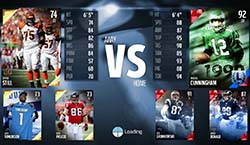
Historic players can be drafted.
Ultimate Team fantasy draft
My feelings of buyer's remorse only grew as I looked through the new features and menu options.
There seems to be a bigger and bigger push towards Madden being an elaborately-crafted system of fantasy football. I already thought that Ultimate Team was trending painfully in that direction. As silly as I think that feature is, Madden players seem to love it - so much so that EA has decided to add another fantasy football-inspired game mode: Draft Champions. As always, all EA's efforts seem to be in trying to make Madden as "game-y" as possible instead of making any efforts to emulate the deeper strategy and nuance of real football. Ultimate Team, and now Draft Champions, are the ultimate expression of that.
Draft Champions is a modified 15-round fantasy draft in which you select from one of three available players in each round. You start by selecting a coach, which grants you a specific offensive and defensive play style for you team, and so you want to try to get players that best fit into those schemes - if you're lucky enough to be offered any. In the final round, you also get to chose one of three Hall of Fame historical players, such as Randall Cunningham or Rod Woodson. Once the draft is done, you play a sudden-death "season" of three games. One loss, and you're done.
I complained about the rushed pacing of games in Madden 15, but the "games" in Draft Champions are only half that time! Three minutes in a quarter is not enough time to play football at all. The game even taunts you by forcing you to have to chose a coach and team style in the first round, and you'd have to be masochistic to chose anything other than "long pass" or "medium pass". Chosing "ground and pound" was barely viable with six minute quarter; it's virtually pointless with three minute quarters. A twelve minute game isn't long enough to establish any kind of "pounding" running game. All you have to do is listen to the commentary to hear how screwed up such a fast game is. Every game, the commentators talk about how it's been a "defensive battle" going into the two-minute warning or halftime - because one team had the ball for the entire half! It's nonsense!
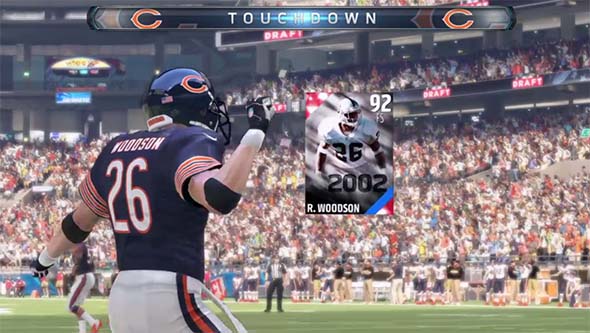
Draft Champions might be more worthwhile if you got to keep some of the players you drafted and add them to MUT.
I'll grant this to the game: the second two Draft Champion games are very tense. The short time time frame and insta-death nature of the mode means you have to play virtually perfectly. Of course, that's to be expected when you start the game in a four-minute drill.
And what do you get for your effort? What reward is worth this idiotic waste of time? You get some PSN trohies / XBox Live achievements, and some packs of Ultimate Team cards (most of which are just redeemable for points to buy other cards). You don't even get to keep the cards that you drafted in Champions mode - just random packs. Eventually, after you beat Draft Champions enough times, you get some elite MUT cards. Oooh... [hand waving] Why is Draft Champions even its own mode on the main menu? Why isn't it just an option in the MUT menu? It's basically just a fantasy draft and preseason for MUT, but you don't even get to keep the players! So what's the point?!
The question that I'm left with is: has Madden jumped the shark? Is this the point where I have to just give up on the idea that EA will ever want to pull Madden back to its simulation football roots? Has it so completely diverged from what I expect from an NFL-licensed football game that I just can't take it seriously anymore as an NFL-licensed football game? I'm tempted to just not even bother with the rest of this review if this is the kind of trash that EA is going to waste their time with. If EA thinks that this is the way of the future for football gaming, then I want no part of it.
But, for old times sake, I guess I can go over the actual football parts of the game, give it at least one more stab at being taken seriously, so click here to read the rest of the review... [More]
ac360be0-195e-4576-8ce9-1ac4ad0f6895|2|5.0
Tags:Madden NFL 16, Madden NFL, EA, EA Sports, Tiburon, sports, football, NFL, simulation, Ignite Engine, draft champions, ultimate team, fantasy football, connected careers, franchise, skills trainer, receivers, catching, passing, defensive back, preseason, PS4, Odell Beckham Jr.
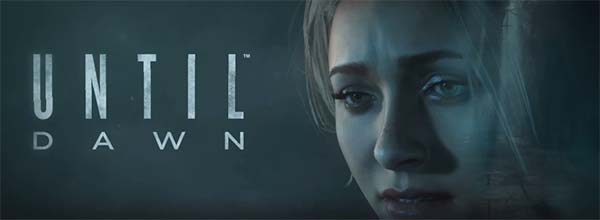
Here is a game that somehow managed to slip under the radar for me. As a snob for strong narrative-based games, I was surprised that a project like Until Dawn managed to escape my attention until a couple weeks prior to its release. Once I heard about it though, I was immediately intrigued. I knew it wasn't going to be a proper survival horror game, but it looked to have a lot of potential to move the horror genre (and gaming in general) in interesting directions. I was doubly surprised when I went to go by the game a couple days after its release so that I could play it over the weekend, only for it to be sold out in the two stores that I went to. It's the first time in about ten years that I've had trouble finding a game on store shelves within a week of its release, but I doubt that I'll have to break my long-standing boycott for pre-orders. So I had to resort to ordering it off of Amazon Prime with 2-day delivery and play it the next weekend.
Suspend your disbelief - and your common sense
Don't be fooled into thinking that Until Dawn is something other than what it is. It is an interactive movie with branching story. It is not an open-ended survival game! Anyone familiar with Heavy Rain or the Telltale Games will have a good idea of how the game will play out. The things you do and the actions and dialogue available are very tightly scripted. You won't be making decisions on how the group splits up, who goes where, or even what any individual character might be doing at any given time. Large chunks of the game are just dialogue and cutscenes, stopping you every now and then to let you make one of two choices, or showing a button prompt on screen to keep the action going (and sometimes keep the character alive). There are even some action sequences that could have been playable, but which are strictly non-interactive cutscenes.

How about lighting some friggin' candles instead of groping around in the dark?
The only time that the game opens up more is when you must explore rooms for clues or evidence. In these cases, you have complete control of character movement and can walk around mostly freely. But interactions are severely limited. You can only interact with the select few objects that the developers intended for you to interact with.
These limitations can be very frustrating because the game doesn't let you do some obvious, common sense things. Upon entering the lodge, I'd like to have been able to light the candles instead of having to wander around in the dark for the next few chapters. Later, when investigating something crashing through a window, I'd like to have been able to take the rifle I just found on the wall. And even later, after the rifle didn't have enough bullets to shoot the murderer, it would be nice to have been able to open up the revolver I just found to make sure that it's loaded and find out how many bullets are in the chamber. And the list of dumb oversights goes on...
Common sense precautions like taking a melee weapon or checking that your new gun is loaded are not possible.
These limitations are further exacerbated by the esoteric nature of some of the decisions. Since all decision are binary (usually consisting of a "helpful" / "safe" option or an "antagonistic" / "risky" option), it's often unclear exactly what the character will do, and the outcome often plays out in a non-interactive cutscene. The character may not say or do exactly what the option described, which might lead the player to think "that's not what I meant to do / say!", and sometimes a decision might railroad you into following through in a way that you don't want to.
Granted, the options need to be somewhat vague, and the consequences shouldn't be obvious. That would make the game too easy and dull. The game has to utilize some of the classic horror movie tropes in order for the narrative to work. After all, the characters don't have the foresight to know that they're in a horror movie game. I accept that there needs to be limitations on the precautions that the player can take, but the player also needs to feel like they have more agency. [More]
1eebd3c1-dc0a-4bc2-9d50-ae593ac587ec|4|2.8
Tags:Until Dawn, Supermassive Games, PlayStation, PS4, PSN, Sony, exclusive, horror, cabin, slasher, saw, consequences, narrative, drama, pre-order, Hayden Panettiere, Peter Stormare, Brett Dalton, Rami Malek, Galadriel Stineman, Noah Fleiss, Jordan Fisher, Nichole Bloom, Meaghan Martin, Ella Lentini
|

| 12 | | | | | | | 60 | | 11 | | | | | | | 55 | | 10 | | | | | | | 50 | | 09 | | | | | | | 45 | | 08 | | | | | | | 40 | | 07 | | | | | | | 35 | | 06 | | | | | | | 30 | | 05 | | | | | | | 25 | | 04 | | | | | | | 20 | | 03 | | | | | | | 15 | | 02 | | | | | | | 10 | | 01 | | | | | | | 05 |
|